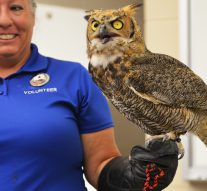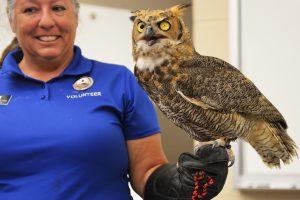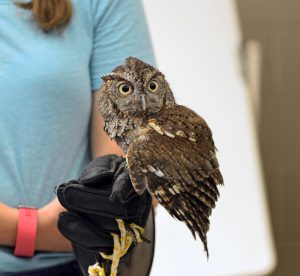
Florida’s Feathered Friends
SPC Programs & Events, Uncategorized October 9, 2017By William Lambert
Volunteer caregivers from the Audubon Moccasin Lake Nature Park, located in Clearwater, Florida, visited the Tarpon Springs campus of Saint Petersburg College to raise awareness for bird safety as part of the Environmental Lecture series, hosted by the Tarpon Springs Environmental Sciences Club. The volunteers brought four beautiful, Florida-native, non-releasable owls that the caregivers have rescued and given a new home to. The owls seemed happy to see a bunch of new faces and curious about the unfamiliar surroundings.

Squeaky with volunteer Kim
Squeaky, the great horned owl, was rescued by Cheryl, one of the guest speakers, after he fell out of his nest when he was six days old. During Squeaky’s rehab in Apopka, his left eye developed an infection that stole his vision despite the care givers’ best efforts Squeaky with volunteer Kim. Cheryl drove to visit him eleven times out in Apopka, so Squeaky would have a familiar face to welcome him to his new “forever home” at the nature park. Clem is an older barred owl that gets along well with Squeaky, and is non-releasable for vision loss, like Squeaky. Squeaky nor Clem are able to hunt for food on their own. The volunteers at Audubon Moccasin Lake Nature Park do a wonderful job, heaps of hard work, and the volunteers put a great deal of love and effort into the care of their birds.
Cheryl is currently training a redtail hawk. The hawk was shot eight times while living wild in Plant City. There are no leads on who shot the hawk. Cheryl hopes that one day the hawk might trust her enough that it will climb up on her glove and aid her in spreading awareness.
Many bird injuries and deaths caused by people are preventable. Vehicular collisions are the number one cause of death for all birds of prey. The chances of a bird being hit can be minimized by local governments and landowners through the planting and growth of trees and scrub barriers along roads that cross through hunting grounds (“Barn”). Pest control is another hazard that Kim, a volunteer from the park, brings up along with a solution. Kim recommends that closed traps be substituted for poisons and pesticides, as the toxins will kill birds second-hand, and open-faced traps will often catch and kill birds of prey. All too often, mother birds, owlets, and eggs die because of rat poison. Similarly, people can leave birds of prey without nests and food when wildlife habitats undergo logging and development. To help offset the losses, the public can put up nestboxes in their yards to provide additional nests for cavity nesting owls, new safe havens for their mates and their owlets.

Cass being held by Jaydon
In other words, it is important for society to contribute to the protection of Florida’s local birds of prey, and the Moccasin Lake Nature Park is doing their best to contribute to the effort. The park is nearly full, currently home to twenty-four birds, and is looking to expand their bird housing capacity. Squeaky’s new enclosure was finished a few days before the visit, and the park workers are currently planning both a nocturnal and kestrel enclosure.
If a wounded bird of prey is discovered, a volunteer coordinator can be contacted at (813) 205-1851, and he or she will route aid to the bird based on location and situation. For those looking for more bird pictures, like this one of an eastern screech owl, they can find them on the park’s instagram page @clearwaterbirdsofprey, curated by both park volunteers Kim and Jen.
Abudan Moccasin Lake Nature Park is located at 2750 Park Trail Ln, Clearwater, FL 33759, and is open to the public Thursday through Sunday. Owl bet everyone at the park would love to have more visitors!
Works Cited
“Barn Owl Hazards: Major Roads.” The Barn Owl Trust, www.barnowltrust.org.uk/hazards-solutions/barn-owls-major-roads/.





